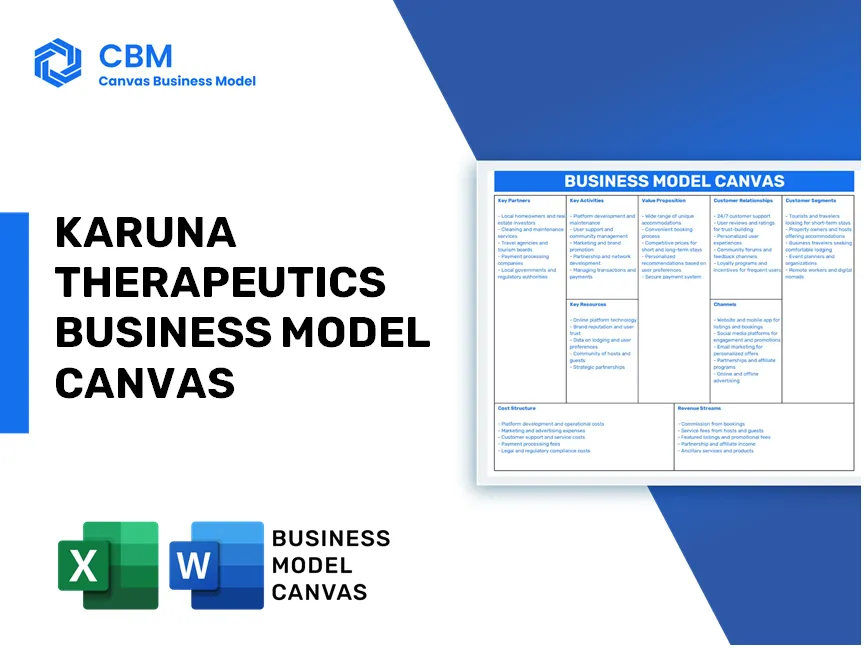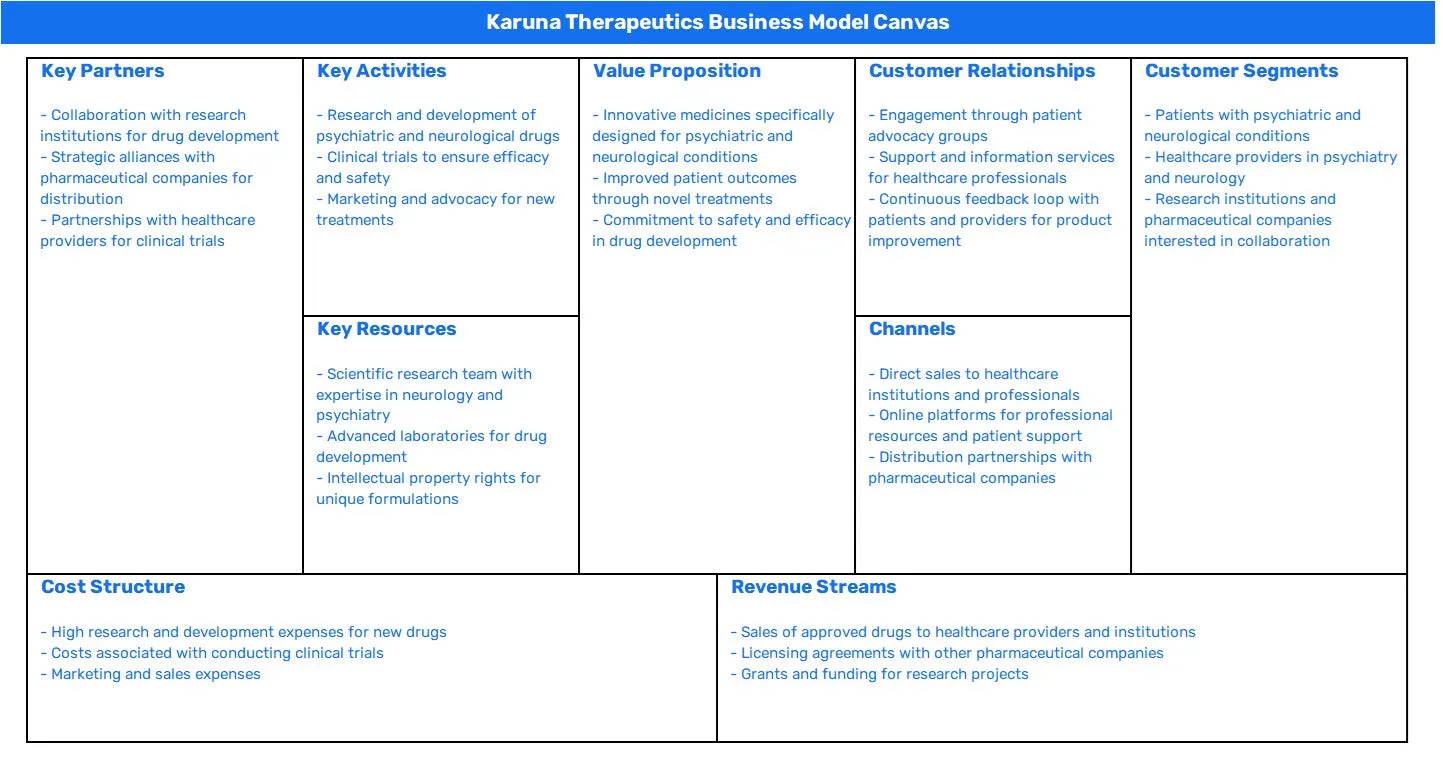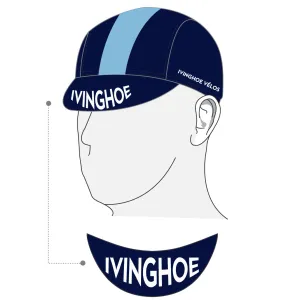Key Partnerships
Collaboration with research institutions for drug development: Karuna Therapeutics has established partnerships with leading research institutions to support the development of innovative therapies for neuropsychiatric disorders. By working closely with experts in the field, Karuna can leverage cutting-edge research and scientific knowledge to advance their drug development efforts.
Strategic alliances with pharmaceutical companies for distribution: In order to bring their novel therapies to market, Karuna has formed strategic alliances with pharmaceutical companies to support distribution and commercialization efforts. These partnerships enable Karuna to reach a wider audience and ensure that their products are available to those who could benefit from them.
Partnerships with healthcare providers for clinical trials: Karuna collaborates with healthcare providers to conduct clinical trials and gather data on the safety and efficacy of their therapies. By partnering with healthcare providers, Karuna can ensure that their trials are conducted in a rigorous and ethical manner, and that they have access to the expertise needed to analyze and interpret the results.
[cbm_canvas_top]
Key Activities
Research and development of psychiatric and neurological drugs: Karuna Therapeutics is dedicated to advancing the field of psychiatric and neurological medicine through cutting-edge research and development. Our team of scientists and researchers work tirelessly to identify novel targets for drug development, conduct preclinical studies to understand the mechanisms of action, and formulate new compounds that have the potential to address unmet medical needs in mental health.
Clinical trials to ensure efficacy and safety: Once a promising drug candidate has been identified, Karuna Therapeutics conducts rigorous clinical trials to evaluate its efficacy and safety in patients. These trials follow a strict protocol and are designed to collect data on the drug's effectiveness, side effects, and optimal dosages. By conducting these trials, we aim to demonstrate the therapeutic benefits of our drugs and obtain regulatory approval for their use in patients.
Marketing and advocacy for new treatments: In addition to developing new drugs, Karuna Therapeutics also focuses on raising awareness about mental health disorders and advocating for better treatment options. Our marketing team works to educate healthcare professionals, patients, and the general public about the benefits of our therapies and the importance of seeking help for mental health conditions. We also collaborate with advocacy organizations to promote policies that support access to innovative treatments for psychiatric and neurological disorders.
Key Resources
Scientific research team with expertise in neurology and psychiatry: Karuna Therapeutics boasts a team of highly skilled scientists, researchers, and clinicians with a deep understanding of neurology and psychiatry. This team is responsible for driving innovation and developing breakthrough treatments for a range of neurological and psychiatric disorders.
Advanced laboratories for drug development: Karuna Therapeutics has state-of-the-art laboratories equipped with cutting-edge technology for drug discovery and development. These facilities allow the team to conduct experiments, analyze data, and test potential treatments efficiently and effectively.
Intellectual property rights for unique formulations: Karuna Therapeutics holds valuable intellectual property rights for its unique formulations and drug candidates. These rights provide a competitive advantage in the market and protect the company's innovations from being copied or replicated by competitors.
Value Propositions
Innovative Medicines for Psychiatric and Neurological Conditions: Karuna Therapeutics is dedicated to developing cutting-edge medicines specifically designed to target psychiatric and neurological conditions. These innovative treatments aim to address the unmet needs of patients suffering from disorders such as schizophrenia, Alzheimer's disease, and pain.
Improved Patient Outcomes: Our value proposition centers on improving patient outcomes through the introduction of novel treatments. By leveraging our deep understanding of the underlying biology of these conditions, we are able to develop therapies that target the root causes of these disorders, leading to better outcomes for patients.
Commitment to Safety and Efficacy: At Karuna Therapeutics, we prioritize the safety and efficacy of our drug development programs. Through rigorous research and clinical trials, we ensure that our therapies are not only effective but also safe for patients to use. Our commitment to excellence in drug development sets us apart in the industry.
- Focus on innovative medicines for psychiatric and neurological conditions
- Goal of improving patient outcomes through novel treatments
- Commitment to safety and efficacy in drug development
Customer Relationships
Karuna Therapeutics values building strong relationships with its customers to better serve their needs and provide the best possible support. By focusing on customer relationships, the company aims to create a positive experience for patients, healthcare professionals, and advocacy groups.
- Engagement through patient advocacy groups: Karuna Therapeutics collaborates with patient advocacy groups to understand the needs and preferences of patients. By engaging with these groups, the company can better tailor its products and services to meet the unique challenges faced by patients.
- Support and information services for healthcare professionals: Karuna Therapeutics provides healthcare professionals with support and information services to ensure they have the necessary resources to effectively prescribe and monitor the company's products. By offering ongoing support, the company aims to build trust and loyalty among healthcare professionals.
- Continuous feedback loop with patients and providers for product improvement: Karuna Therapeutics values feedback from both patients and healthcare providers to continuously improve its products and services. By actively seeking feedback and incorporating it into product development, the company can better meet the needs of its customers and drive innovation in the industry.
Channels
Karuna Therapeutics utilizes multiple channels to reach its target audience and distribute its products effectively.
Direct Sales: The company employs a direct sales approach to reach out to healthcare institutions and professionals. This involves building relationships with key decision-makers in hospitals, clinics, and medical practices to promote Karuna's products and services. By establishing a direct line of communication, the sales team can educate healthcare professionals about the benefits of Karuna's innovative therapies and how they can improve patient outcomes.
Online Platforms: Karuna also leverages online platforms to provide resources for healthcare professionals and support for patients. Through a secure portal, professionals can access information about Karuna's products, clinical trials, and treatment guidelines. Patients can also find valuable resources such as FAQs, treatment options, and support services to manage their condition effectively.
Distribution Partnerships: In addition to direct sales and online platforms, Karuna Therapeutics collaborates with pharmaceutical companies to distribute its products on a larger scale. By partnering with established distributors, Karuna can expand its reach and access new markets more efficiently. These strategic partnerships allow the company to leverage the distribution networks of its partners to deliver its therapies to a wider audience.
- Direct sales to healthcare institutions and professionals
- Online platforms for professional resources and patient support
- Distribution partnerships with pharmaceutical companies
Customer Segments
Patients with psychiatric and neurological conditions: Our primary customer segment includes individuals who are seeking treatment for various psychiatric and neurological conditions such as schizophrenia, depression, Alzheimer's disease, and Parkinson's disease. These patients are looking for innovative and effective therapies that can improve their quality of life and overall well-being.
Healthcare providers in psychiatry and neurology: Our second customer segment consists of healthcare providers specializing in psychiatry and neurology, including psychiatrists, neurologists, and other medical professionals. These providers are interested in accessing new treatment options to better serve their patients and improve treatment outcomes.
Research institutions and pharmaceutical companies: Another key customer segment includes research institutions and pharmaceutical companies that are looking to collaborate with us on developing novel therapies for psychiatric and neurological conditions. These organizations are interested in partnering with us to advance scientific research and bring new treatments to market.
- Effective therapies for patients
- New treatment options for healthcare providers
- Collaborative research opportunities for institutions and pharmaceutical companies
Cost Structure
One of the key components of Karuna Therapeutics' business model canvas is its cost structure. The company incurs significant expenses in several areas to develop and bring new therapeutics to market.
High research and development expenses for new drugs
- Karuna Therapeutics invests heavily in research and development to discover and develop new drugs for the treatment of neuropsychiatric disorders.
- This includes costs related to hiring research staff, conducting experiments, and acquiring technology and resources to advance drug candidates from the preclinical stage to clinical testing.
- These expenses can be substantial due to the complex nature of drug development and the need for rigorous testing to ensure safety and efficacy.
Costs associated with conducting clinical trials
- Another significant cost for Karuna Therapeutics is conducting clinical trials to test the safety and efficacy of its drug candidates in human subjects.
- This includes expenses related to recruiting and enrolling participants, monitoring their progress, and collecting and analyzing data to evaluate the drug's performance.
- These costs can vary depending on the size and scope of the clinical trial, as well as the number of sites involved and the duration of the study.
Marketing and sales expenses
- Once a drug has been approved for commercialization, Karuna Therapeutics incurs costs related to marketing and sales activities to promote the product and reach target customers.
- This includes expenses such as advertising, promotional materials, sales force salaries, and distribution costs to ensure the drug reaches patients in need.
- These expenses are essential to generate revenue and drive market adoption of the company's therapeutics.
Revenue Streams
Sales of approved drugs to healthcare providers and institutions: Karuna Therapeutics generates revenue through the sales of its approved drugs to healthcare providers and institutions. These drugs are targeted towards treating symptoms of neuropsychiatric disorders, such as schizophrenia and Alzheimer's disease. By partnering with distributors and establishing relationships with healthcare institutions, Karuna is able to reach a wide range of patients in need of these medications.
Licensing agreements with other pharmaceutical companies: Another revenue stream for Karuna Therapeutics comes from licensing agreements with other pharmaceutical companies. By allowing these companies to use its patented technologies or drugs, Karuna can earn royalties or upfront payments. This not only provides an additional source of revenue for the company, but also helps to expand the reach of its products into new markets.
Grants and funding for research projects: Karuna Therapeutics also relies on grants and funding for research projects to generate revenue. By securing funding from government agencies, private organizations, and investors, the company is able to support its research and development efforts. This funding can be used to explore new drug candidates, conduct clinical trials, and advance the understanding of neuropsychiatric disorders.
[cbm_canvas_bottom]













